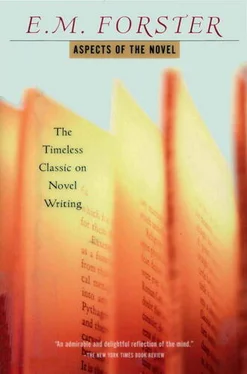This constant reference to genius is another characteristic of the pseudo-scholar. He loves mentioning genius, because the sound of the word exempts him from trying to discover its meaning. Literature is written by geniuses. Novelists are geniuses. There we are; now let us classify them. Which he does. Everything he says may be accurate but all is useless because he is moving round books instead of through them, he either has not read them or cannot read them properly. Books have to be read (worse luck, for it takes a long time); it is the only way of discovering what they contain. A few savage tribes eat them, but reading is the only method of assimilation revealed to the west. The reader must sit down alone and struggle with the writer, and this the pseudo-scholar will not do. He would rather relate a book to the history of its time, to events in the life of its author, to the events it describes, above all to some tendency. As soon as he can use the word "tendency" his spirits rise, and though those of his audience may sink, they often pull out their pencils at this point and make a note, under the belief that a tendency is portable.
That is why, in the rather ramshackly course that lies ahead of us, we cannot consider fiction by periods, we must not contemplate the stream of time. Another image better suits our powers: that of all the novelists writing their novels at once. They come from different ages and ranks, they have different temperaments and aims, but they all hold pens in their hands, and are in the process of creation. Let us look over their shoulders for a moment and see what they are writing. It may exorcise that demon of chronology which is at present our enemy and which (we shall discover next week) is sometimes their enemy too. "Oh, what quenchless feud is this, that Time hath with the sons of men," cries Herman Melville, and the feud goes on not only in life and death but in the byways of literary creation and criticism. Let us avoid it by imagining that all the novelists are at work together in a circular room. I shall not mention their names until we have heard their words, because a name brings associations with it, dates, gossip, all the furniture of the method we are discarding.
They have been instructed to group themselves in pairs. We approach the first pair, and read as follows:
I.I don't know what to do—not I. God forgive me, but I am very impatient! I wish—but I don't know what to wish without a sin. Yet I wish it would please God to take me to his mercy!—I can meet with none here.—What a world is this!—What is there in it desirable? The good we hope for so strangely mixed, that one knows not what to wish for! And one half of mankind tormenting the other and being tormented themselves in tormenting.
II.What I hate is myself—when I think that one has to take so much, to be happy, out of the lives of others, and that one isn't happy even then. One does it to cheat one's self and to stop one's mouth—but that is only, at the best, for a little. The wretched self is always there, always making us somehow a fresh anxiety. What it comes to is that it's not, that it's never, a happiness, any happiness at all, to take. The only safe thing is to give. It's what plays you least false.
It is obvious that here sit two novelists who are looking at life from much the same angle, yet the first of them is Samuel Richardson, and the second you will have already identified as Henry James. Each is an anxious rather than an ardent psychologist. Each is sensitive to suffering and appreciates self-sacrifice; each falls short of the tragic, though a close approach is made. A sort of tremulous nobility —that is the spirit that dominates them—and oh how well they write!—not a word out of place in their copious flows. A hundred and fifty years of time divide them, but are not they close together in other ways, and may not their neighbourliness profit us? Of course as I say this I hear Henry James beginning to express his regret—no, not his regret but his surprise—no, not even his surprise but his awareness that neighbourliness is being postulated of him, and postulated, must he add, in relation to a shopkeeper. And I hear Richardson, equally cautious, wondering whether any writer born outside England can be chaste. But these are surface differences, are indeed no differences at all, but additional points of contact. We leave them sitting in harmony, and proceed to our next pair.
I.All the preparations for the funeral ran easily and happily under Mrs. Johnson's skilful hands. On the eve of the sad occasion she produced a reserve of black sateen, the kitchen steps, and a box of tintacks, and decorated the house with festoons and bows of black in the best possible taste. She tied up the knocker with black crêpe, and put a large bow over the corner of the steel engraving of Garibaldi, and swathed the bust of Mr. Gladstone that had belonged to the deceased with inky swathings. She turned the two vases that had views of Tivoli and the Bay of Naples round, so that these rather brilliant landscapes were hidden and only the plain blue enamel showed, and she anticipated the long contemplated purchase of a tablecloth for the front room, and substituted a violet purple cover for the now very worn and faded raptures and roses in plushette that had hitherto done duty there. Everything that loving consideration could do to impart a dignified solemnity to her little home was done.
II.The air of the parlour being faint with the smell of sweet cake, I looked about for the table of refreshments; it was scarcely visible until one had got accustomed to the gloom, but there was a cut-up plum cake upon it, and there were cut-up oranges, and sandwiches, and biscuits, and two decanters that I knew very well as ornaments, but had never seen used in all my life; one full of port, and one of sherry. Standing at this table, I became conscious of the servile Pumblechook in a black cloak and several yards of hat-band, who was alternately stuffing himself, and making obsequious movements to catch my attention. The moment he succeeded, he came over to me (breathing sherry and crumbs) and said in a subdued voice, "May I, dear sir?" and did.
These two funerals did not by any means happen on the same day. One is the funeral of Mr. Polly's father (1920), the other the funeral of Mrs. Gargery in Great Expectations (1860). Yet Wells and Dickens are describing them from the same point of view and even using the same tricks of style (cf. the two vases and the two decanters). They are, both, humorists and visualizers who get an effect by cataloguing details and whisking the page over irritably. They are generous-minded; they hate shams and enjoy being indignant about them; they are valuable social reformers; they have no notion of confining books to a library shelf. Sometimes the lively surface of their prose scratches like a cheap gramophone record, a certain poorness of quality appears, and the face of the author draws rather too near to that of the reader. In other words, neither of them has much taste: the world of beauty was largely closed to Dickens, and is entirely closed to Wells. And there are other parallels—for instance their method of drawing character, but that we shall examine later on. And perhaps the great difference between them is the difference of opportunity offered to an obscure boy of genius a hundred years ago and to a similar boy forty years ago. The difference is all in Wells' favour. He is far better educated than his predecessor; in particular the addition of science has strengthened his mind out of recognition and subdued his hysteria. He registers an improvement in society: Dotheboys Hall has been superseded by the Polytechnic. But he does not register any change in the novelist's art.
What about our next pair?
Читать дальше












